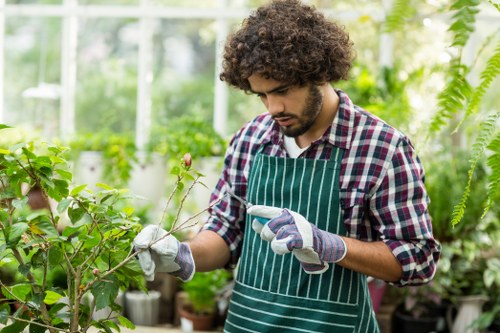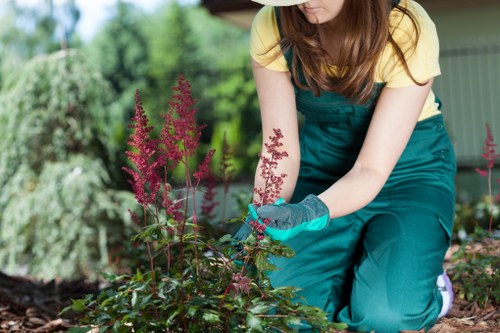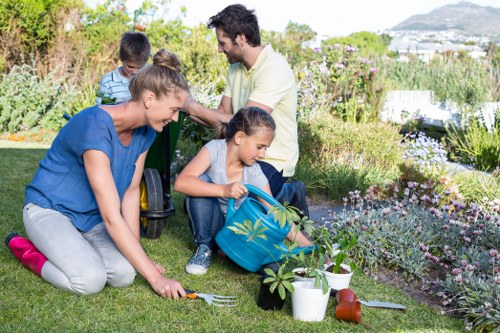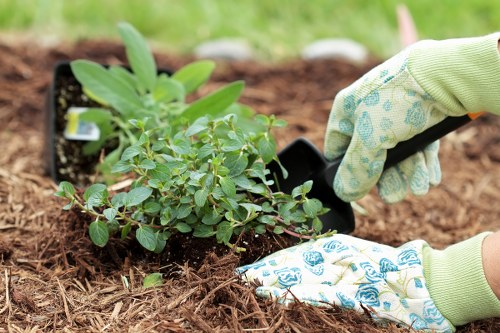Comprehensive Guide to Garden Maintenance in Leyton

Maintaining a beautiful garden in Leyton requires a blend of planning, regular care, and an understanding of the local climate. Whether you’re an avid gardener or a beginner, effective garden maintenance can transform your outdoor space into a relaxing and vibrant sanctuary.
In Leyton, the climate plays a significant role in garden upkeep. With mild winters and warm summers, gardeners must adapt their strategies to ensure plants thrive throughout the year. This article delves into essential garden maintenance practices tailored specifically for Leyton residents.
From soil preparation to seasonal tasks, we cover everything you need to know to keep your garden healthy and aesthetically pleasing. Let’s explore the best practices for garden maintenance in Leyton.

Understanding Leyton’s Climate and Its Impact on Gardening
The climate in Leyton is classified as temperate, characterized by moderate rainfall and mild temperatures. This climate is conducive to a wide variety of plants, both native and exotic. However, understanding the nuances of Leyton’s weather patterns is crucial for successful garden maintenance.
Key Climate Features:
- Temperature: Average temperatures range from 2°C in winter to 25°C in summer.
- Rainfall: Leyton receives approximately 600mm of rainfall annually, distributed fairly evenly throughout the year.
- Sunlight: Gardens generally receive a good amount of sunlight, with some areas experiencing partial shade.
These conditions influence plant selection, watering schedules, and protection measures against extreme weather events like frost or heavy rains.

Choosing the Right Plants for Leyton Gardens
Selecting plants that are well-suited to Leyton’s climate is the foundation of effective garden maintenance. Opt for species that can thrive in the local conditions, ensuring minimal stress and reduced maintenance efforts.
Top Plant Choices:
- Roses: Hardy and versatile, roses flourish in Leyton’s climate with proper care.
- Lavender: Requires well-drained soil and plenty of sunlight, making it ideal for Leyton gardens.
- Hostas: Perfect for shaded areas, adding lush foliage and color.
Incorporating a mix of perennials, annuals, and shrubs can create a dynamic and resilient garden ecosystem.

Essential Garden Maintenance Tasks
Maintaining a garden involves a series of regular tasks that keep the space healthy and attractive. Here are the essential maintenance activities every Leyton gardener should perform:
1. Soil Preparation and Health
Healthy soil is the bedrock of a thriving garden. Regularly testing and amending the soil ensures that plants receive the necessary nutrients.
Steps for Soil Maintenance:
- Testing: Conduct soil tests to determine pH levels and nutrient content.
- Amending: Add compost or organic matter to improve soil structure and fertility.
- Mulching: Apply mulch to retain moisture, suppress weeds, and regulate soil temperature.
2. Watering Strategies
Proper watering is vital, especially during dry spells. Leyton’s rainfall is generally sufficient, but supplemental watering may be necessary during prolonged dry periods.
Best Practices:
- Early Morning: Watering in the early morning reduces evaporation and allows plants to absorb moisture effectively.
- Deep Watering: Encourage deep root growth by watering thoroughly rather than frequently.
- Drip Irrigation: Install drip irrigation systems for efficient and targeted watering.
3. Pruning and Trimming
Regular pruning promotes healthy growth and removes dead or diseased branches, enhancing the garden’s appearance.
Pruning Tips:
- Seasonal Pruning: Prune spring-flowering plants immediately after they bloom.
- Tool Maintenance: Keep pruning tools sharp and clean to prevent plant damage.
- Technique: Cut at a 45-degree angle to encourage proper healing.

Pest and Disease Management
Protecting your garden from pests and diseases is crucial for maintaining plant health. Integrated Pest Management (IPM) strategies can effectively control issues without harmful chemicals.
Identifying Common Pests in Leyton
Being aware of the prevalent pests helps in early detection and control.
- Aphids: Small insects that suck sap from plants, causing deformation.
- Snails and Slugs: Feed on leaves and stems, especially during damp conditions.
- Spider Mites: Tiny arachnids that cause stippling on leaves.
Natural Remedies and Treatments
Opt for eco-friendly solutions to manage pests and diseases.
- Neem Oil: An effective natural pesticide that disrupts pest life cycles.
- Beneficial Insects: Encourage ladybugs and praying mantises to control aphid populations.
- Hand-Picking: Manually remove larger pests like snails and caterpillars.
Preventative Measures
Implementing preventative strategies can minimize pest and disease outbreaks.
- Crop Rotation: Avoid planting the same species in the same location year after year.
- Sanitation: Remove plant debris and fallen leaves that can harbor pests.
- Resistant Varieties: Choose plant varieties that are resistant to common diseases.

Seasonal Garden Maintenance
Each season brings unique challenges and opportunities for garden care. Adapting your maintenance routine to the changing seasons ensures a robust and vibrant garden year-round.
Spring
Spring is the time for rejuvenation and preparation. Focus on:
- Planting: Introduce new plants and seeds as the weather warms.
- Soil Preparation: Enrich the soil with compost and fertilizers.
- Pruning: Trim back overgrown shrubs and trees to encourage new growth.
Summer
During the summer months, emphasize:
- Watering: Ensure plants receive adequate moisture, especially during heatwaves.
- Weed Control: Regularly remove weeds to prevent competition for resources.
- Pest Monitoring: Keep an eye out for pests and address issues promptly.
Autumn
Autumn is ideal for:
- Leaf Cleanup: Rake and remove fallen leaves to prevent mold and disease.
- Planting Bulbs: Prepare for spring blooms by planting bulbous plants.
- Soil Amendment: Add mulch and compost to protect the soil during winter.
Winter
In winter, focus on:
- Protection: Shield sensitive plants from frost with covers or mulches.
- Tool Maintenance: Clean and store garden tools properly.
- Planning: Plan garden layouts and order seeds for the upcoming year.

Tools and Equipment for Effective Garden Maintenance
Having the right tools can make garden maintenance more efficient and enjoyable. Invest in quality equipment tailored to your gardening needs.
Essential Tools
- Pruners: For precise trimming of branches and stems.
- Trowel: Ideal for digging, planting, and weeding.
- Garden Hose: Ensure you have a reliable hose with adjustable nozzles for different watering needs.
Advanced Equipment
For larger gardens, consider investing in:
- Lawn Mower: Keeps grass at an even height and promotes healthy growth.
- Electric or Gas Tools: Such as chainsaws and blowers for heavy-duty tasks.
- Compost Bins: Facilitate the recycling of garden waste into valuable compost.
Maintenance Tips
Proper maintenance of your tools extends their lifespan and ensures optimal performance.
- Cleaning: Remove dirt and debris after each use.
- Sharpening: Regularly sharpen blades to maintain cutting efficiency.
- Storage: Keep tools in a dry, secure place to prevent rust and damage.

Professional Garden Maintenance Services in Leyton
While DIY gardening is rewarding, professional garden maintenance services can offer expertise and save you time. Hiring local professionals ensures that your garden receives tailored care suited to Leyton’s specific conditions.
Benefits of Hiring Professionals
- Expertise: Knowledgeable about local plant species and climate conditions.
- Time-Saving: Efficiently manage maintenance tasks, allowing you to enjoy your garden without the effort.
- Comprehensive Services: From design to regular upkeep, professionals offer a range of services to suit your needs.
Choosing the Right Service
When selecting a garden maintenance service in Leyton, consider:
- Experience: Look for companies with a proven track record and positive reviews.
- Services Offered: Ensure they provide the specific maintenance tasks you require.
- Pricing: Compare quotes to find a service that offers good value for money.
Top Services Available
Key services offered by professional garden maintenance providers include:
- Lawn Care: Mowing, fertilizing, and aerating lawns to maintain healthy grass.
- Plant Care: Pruning, planting, and disease management for various plants.
- Seasonal Maintenance: Tailored tasks to address the needs of each season.
Make Your Garden Shine
Investing in professional garden maintenance can elevate the beauty and functionality of your outdoor space, making it a true reflection of your personal style and preferences.

Sustainable Gardening Practices in Leyton
Adopting sustainable gardening practices not only benefits the environment but also enhances the health and resilience of your garden. Sustainable methods are particularly well-suited to Leyton’s climate and urban setting.
Water Conservation
Efficient water usage is essential for sustainable gardening.
- Rainwater Harvesting: Collect rainwater for use in watering plants.
- Mulching: Retains soil moisture and reduces the need for frequent watering.
- Drip Irrigation: Delivers water directly to plant roots, minimizing waste.
Soil Health
Maintaining healthy soil is key to sustainable gardening.
- Composting: Recycle organic waste into nutrient-rich compost.
- Cover Crops: Plant cover crops to prevent soil erosion and improve fertility.
- No-Till Gardening: Reduce soil disturbance to preserve soil structure and microbial life.
Biodiversity
Promoting biodiversity enhances garden resilience and supports local wildlife.
- Native Plants: Incorporate native species that support local ecosystems.
- Pollinator Gardens: Plant flowers that attract bees, butterflies, and other pollinators.
- Habitat Features: Create habitats for beneficial insects and small animals.
Organic Practices
Using organic methods reduces reliance on chemical inputs.
- Natural Fertilizers: Utilize compost, manure, and other organic fertilizers.
- Biological Pest Control: Employ natural predators and organic pesticides.
- Crop Rotation: Prevent soil depletion and reduce pest buildup by rotating plant species.

Enhancing Garden Aesthetics in Leyton
Aesthetics play a vital role in garden maintenance, turning your outdoor space into a visually appealing retreat. Combining plant selection, design principles, and decorative elements can significantly enhance your garden’s beauty.
Garden Design Principles
- Balance: Create a sense of equilibrium with symmetrical or asymmetrical arrangements.
- Unity: Ensure all elements work together harmoniously.
- Focal Points: Incorporate features like statues, fountains, or specimen plants to draw attention.
Plant Arrangement
Thoughtful plant placement enhances both beauty and functionality.
- Layering: Arrange plants in layers (tall, medium, and ground cover) for depth and interest.
- Color Coordination: Use color schemes to create visual harmony and contrast.
- Textural Variety: Combine plants with different leaf shapes and textures for added dimension.
Hardscaping Elements
Incorporate non-plant features to add structure and interest.
- Pathways: Use stone, gravel, or paved paths to guide visitors through the garden.
- Lighting: Install garden lighting to highlight features and extend usability into the evening.
- Seating Areas: Create comfortable spaces for relaxation and enjoyment.
Decorative Features
Enhance your garden with decorative touches.
- Garden Art: Incorporate sculptures, wind chimes, or ornamental stakes.
- Water Features: Add ponds, fountains, or birdbaths for a soothing ambiance.
- Containers and Planters: Use pots and containers to display flowers and add height variation.
Transform Your Outdoor Space
With the right aesthetic choices, your Leyton garden can become a stunning extension of your home, offering beauty and tranquility for years to come.

Conclusion: Achieving a Thriving Garden in Leyton
Effective garden maintenance in Leyton involves a combination of understanding the local climate, selecting appropriate plants, performing regular maintenance tasks, managing pests sustainably, and enhancing garden aesthetics. Whether you choose to maintain your garden yourself or enlist professional help, these practices will ensure your outdoor space remains healthy, beautiful, and a source of pride.
Embrace these strategies to cultivate a thriving garden that reflects your personal style and adapts seamlessly to Leyton’s unique environment.
Ready to transform your garden? Contact us today or book your service now to start your journey towards a stunning Leyton garden.
Frequently Asked Questions
Discover expert tips and essential practices for effective garden maintenance in Leyton. From plant selection to sustainable techniques, transform your outdoor space into a vibrant sanctuary.
Get a QuoteGet In Touch With Us.
Please fill out the form below to send us an email and we will get back to you as soon as possible.

